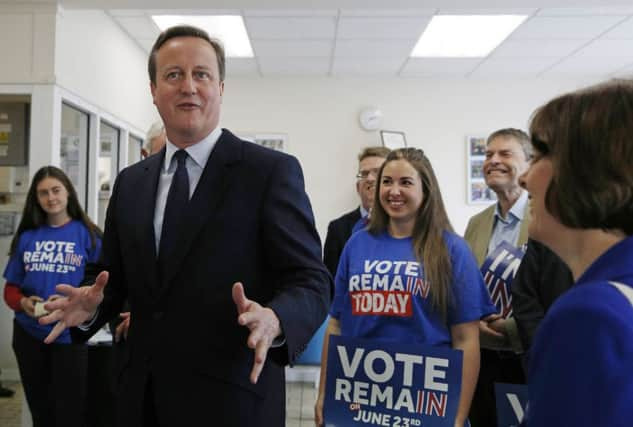Leaders: Consider the big picture before casting vote


On the EU referendum campaigns, a blunt assessment would be that neither has impressed. A glance at the opinion polls also suggests that the electorate is really none the wiser about the way ahead, with the lead changing as we go from one poll to another.
That doesn’t necessarily mean that no convincing arguments exist – it’s more likely that such arguments have either not been well articulated, or have not been heard amid the negativity and scare tactics which have drowned out most of the reasoned debate.
Advertisement
Hide AdAdvertisement
Hide AdFor Mr Cameron, this entire episode has been a failure, regardless of what result the referendum produces by Friday morning, and his political career will come to a spectacular end if Leave triumphs. This was a referendum the UK did not ask for, and arguably did not require, but he chose to put the question to the country in the belief that it would silence the agitators within his own party. Instead, it has taken the UK to the brink of a historic break-up, a scenario Mr Cameron was desperate to avoid happening on his watch when the question was Scottish independence. And there can be little doubt that even in the event of a remain vote the animosity of the campaigning will mean his party has become even more sharply divided over Europe, assuming his party as it is now survives.
The UK could, of course, survive outside the EU, but the issue is whether it would thrive, or at the very least, be no worse off. On this front, the evidence has largely favoured the Remain camp. At its core, the European Union is an economic partnership, and whatever pros and cons are advanced, it is difficult to reach a conclusion that economic performance could be improved by stepping outside the single European market of 500 million people. Consequently, it takes a strong imagination to foresee us as anything other than out of pocket after Brexit.
However, the referendum has gone far beyond this one aspect of the UK’s relationship with the EU, and many voters will be influenced by other factors such as security and migration, both of which are emotive issues with immediate relevance. And for others, the vote comes down to the basic matter of sovereignty – do we want to be directed from Brussels, or would we prefer to keep the decision-making process in the UK? Here, the Leave campaign scores valid points, because even Remain supporters will admit privately that the EU gets involved at levels where matters could be more effectively dealt with by the member state. A revision of jurisdiction would be welcome, but the UK cannot force this to happen, and we can’t forget that Mr Cameron’s attempts to extract concessions from the EU earlier this year did not demonstrate impressive influence.
The two areas where debate has been strong during an otherwise uninspiring campaign are security and immigration. Terrorism casts a shadow over what we have, until recent years, considered to be a civilised way of life, and attacks on the European mainland are no longer a surprise. There is a temptation for this island state to pull up the drawbridge by further restricting the access rights of those who would wish to come here, but that approach underestimates the terrorists. It will take more than laws restricting movement to stop an organisation or individual who is hell-bent on destruction. Only by sharing intelligence can the western world best defend itself against the current threat, and this is not the time to dismantle structures that have been set up for international benefit. A UK intelligence service will, of course, continue to liaise with other countries after Brexit, but a unified approach is required to defeat this new enemy. Who could rejoice in a UK breakaway if our European neighbours continue to be attacked while we turn away to look after our own affairs?
So, finally, we must consider immigration, the subject believed to be responsible for the recent increase in support for Leave. Here, Scotland diverges from the rest if the UK, with Scotland having a pressing need to attract people to live and work here, as we have a long history of doing successfully. But we should be in no doubt that high passions over immigration – and the effect it has on the lives of UK nationals – is driving a significant percentage of Brexit support. We should be aware that overall the economy sees great benefits from migration to our shores.
One of the difficulties in arguing to remain is the nature of how the European Union is currently structured. It is bureaucratic, undemocratic and largely seems unaccountable. We appear to have no influence over its decisions. It is not an exemplary organisation by any means. But that can be changed, perhaps slowly, if one remains a part of it.
However, the decision about Europe has to be about more than the economy and scepticism. There are far greater issues at stake. Closer integration in Europe has virtually eliminated any chance of the terrible wars that so scarred the 20th century. We must believe that a better future will come from co-operation and fellowship with our neighbours. If we go for division now it will be a retrograde step that will colour the future for our children and their children. Surely the brighter future lies with remaining a part of Europe.